This document provides an overview of business ethics and corporate governance. It discusses key concepts like values, ethics, sources of values, types of values, and how values can differ across cultures.
The main points are:
1. Ethics studies concepts like good and evil, right and wrong, and moral philosophy. Values are principles that guide actions and depend on personal judgment.
2. There are many sources of values like family, peers, role models, and institutions that help shape a person's values through socialization and experience.
3. Values can be classified in different ways, such as terminal vs instrumental values, and individual values like practical or moralistic values. Loyalty and ethical behavior are important foundations

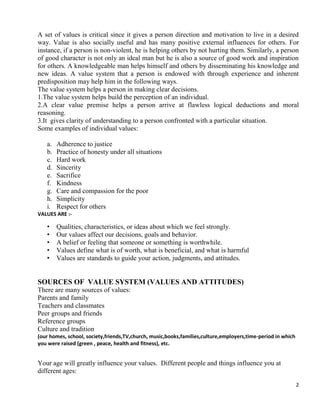
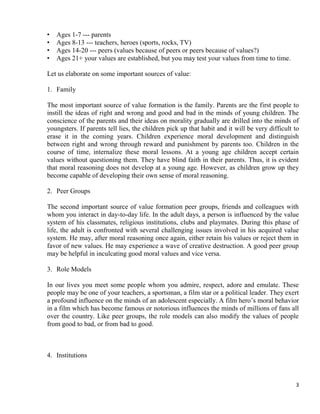
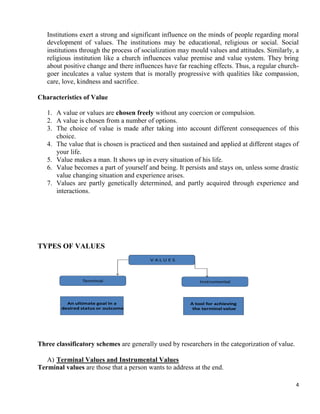
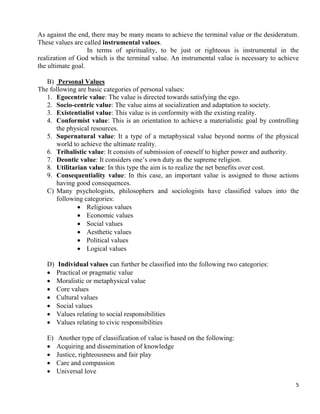

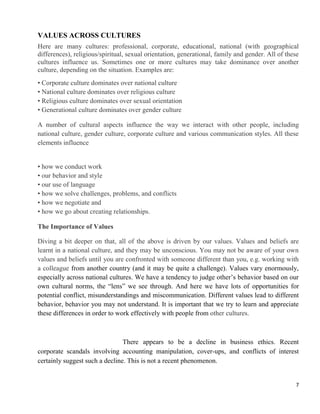

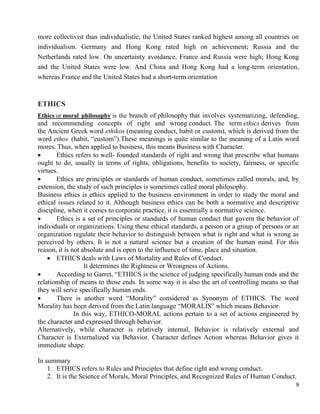


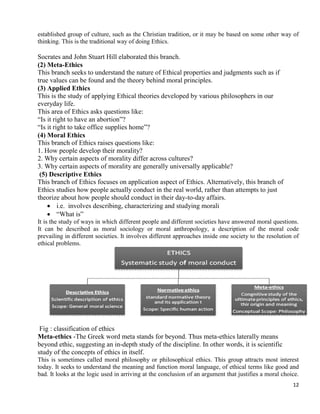

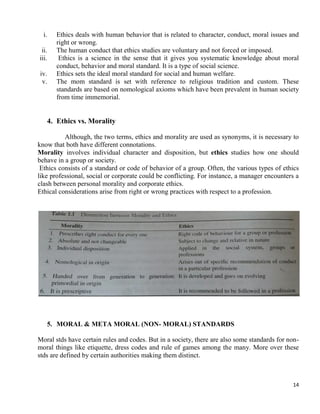


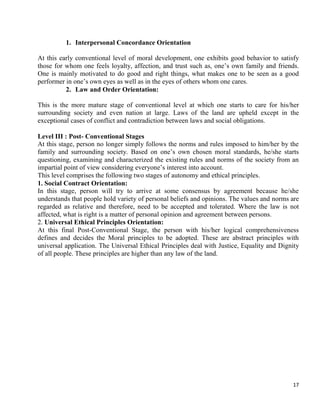



![21
Moral Reasoning involves two essential elements
(1) Understanding of reasonable moral standards
(2) Evidence of these moral standards in behavior, institution, and policy.
Moral Syllogism: It is a form of reasoning in which a conclusion is drawn from two statements.
e.g.: All men must die. I am a man. Therefore, I must die.
Ethical Relativism (ER) and Ethical Absolutism (EA)
ER
It is an empirical fact that all ethical norms and practices are not equally valid and applicable to
all societies. Some ethical norms or practices are acceptable in some countries but not
acceptable in others. For example, caste system or untouchability was accepted in India, but not
in other countries. Matrimony between homosexuals is legally acceptable in the United
Kingdom; based on marital ethics; but is considered unethical and immoral in other countries.
Thus, the meaning of ethical relativism cannot be defined in theory. Ethical
standards differ from country to country or from place to place, and hence the birth of ethical
relativism. Ethical standards are relative to a situation, place, time and circumstances & hence
named as ER.
EA
Relies on the fact that some ethical std‘s are universal, permanent & absolute & are applicable
to all countries and places. They do not change over time.
Eg. Do not steal, don‘t lie etc. This is EA.
Moral
Standards
[On behavior ,
Institution and Policy].
Factual
Information
On behavior,
Institution and Policy].
Moral Judgment
[On rightness or
Wrongness of
actual/factual behavior,
Institution and policy.](https://image.slidesharecdn.com/ethics1-180802053919/85/Ethics-module1-21-320.jpg)
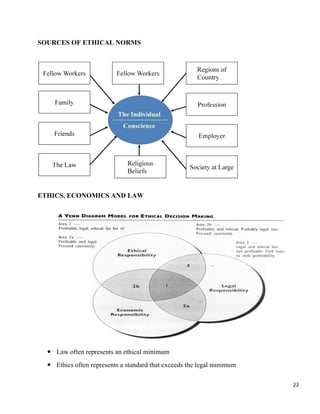





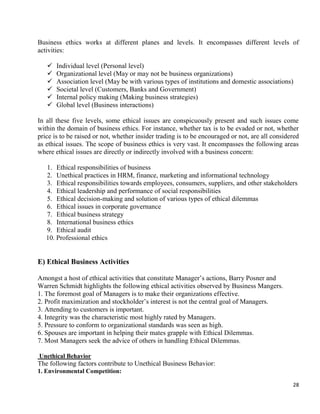
![29
In industries where there is intense competition amongst the companies producing similar
products or services, companies tend to foster unethical behavior in their desire to win customer
confidence.
2. Inter-Organizational Dependence:
Companies that manufacture tinned food items can sell them after getting the approval of Food
Products Organization (FPO). To expedite such approvals, companies tend to foster unethical
practices like bribery or presentation of false data or samples.
Bribery and Kickback can take the forms of money [paying money to get the work
done], gifts [to get the work done by offering gifts like Jewelry, Electronic Gadgets],
entertainment [offering facilities in five star hotels, foreign trips] or political contributions
[Giving donations to political parties to launch their election campaigns, providing them with
hotel accommodation, luxury car for personal use] in order to procure quotas, licenses or
orders.
(a) Bribery: Is a payment or remuneration for performing an act which is
inconsistent with the nature of the work or for which one has been hired to perform. It is in the
form of personal payment, gift or special favor to an official to get the work done.
(b) Kickback: Is different in terms of mode of payment from Bribery. In this,
payment is given after the favor gets completed.
3. Pressure For High Performance:
When workers are pressurized by management to report high performance in terms of
production, they may adopt short cuts, compromise with quality and speed up the assembly
line. This is Unethical in nature.
4. Poor Financial Performance:
If firms are reporting financial losses and heavy debts and are unable to recover them through
regular Business Operations, they may adopt Unethical practices to convert their loss- incurring
units into profit making units.
5. Labor Dissatisfaction:
If workers are dissatisfied with their employer‘s behavior and policies, they resort to Unethical
behavior to show discontentment and disregard for their employers.
Inventory of Ethical Issues in Business(describe the areas in which ethical issues
arise in business)
Employee-Employer Relations
Employer-Employee Relations
Company-Customer Relations
Company-Shareholder Relations
Company-Community/Public Interest
Guidelines for Ethical Behavior
James O‘ Toole prescribes the following guidelines to be followed by Managers:
1. Obey the Law:
Obeying legal practices of the nation is conforming to Ethical values.
2. Tell the Truth:](https://image.slidesharecdn.com/ethics1-180802053919/85/Ethics-module1-29-320.jpg)



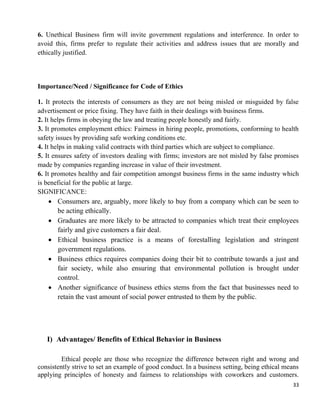

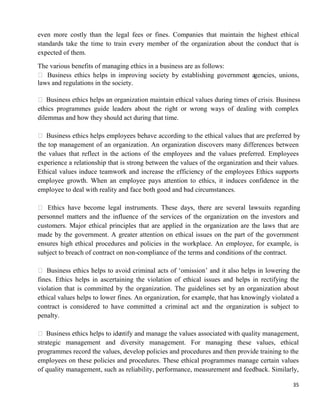




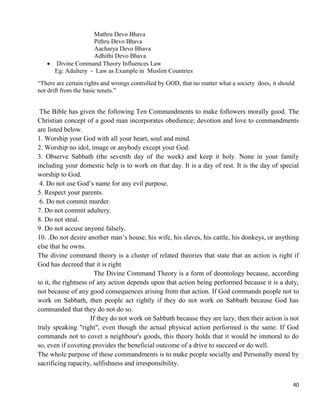
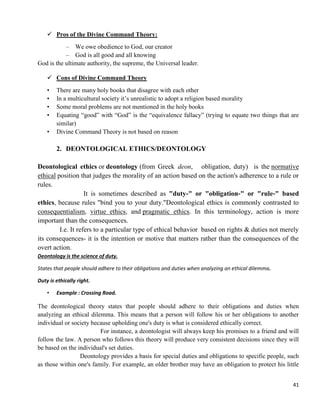

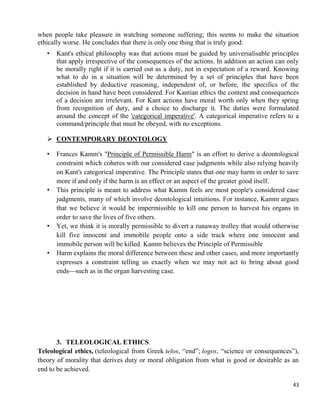


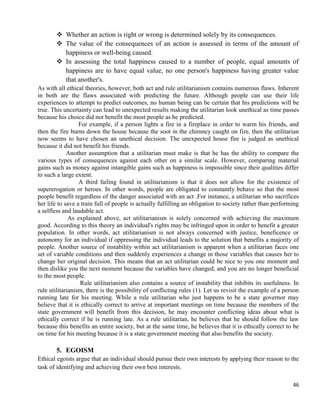
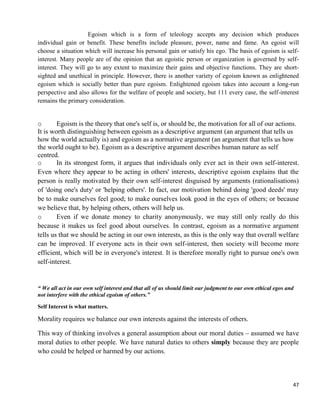
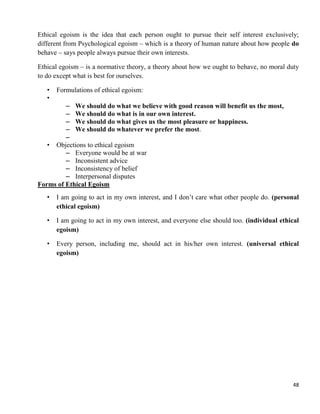



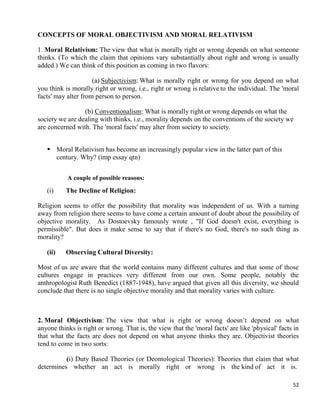
![53
E.g., Immanuel Kant (1724-1804) thought that all acts should be judged according to a rule he
called the Categorical Imperative: "Act only according to that maxim [i.e., rule] whereby you
can at the same time will that it become a universal law." That is, he thought the only kind of
act one should ever commit is one that could be willed to be a universal law.
(ii) Consequentialist Theories (or Teleological Theories):
Theories that claim that what determines whether an act is right or wrong are its consequences.
Utilitarianism is the best known sort of Consequentialism. Its best known defender is John
Stuart Mill (1806-1873). Essentially, utilitarianism tells us that, in any situation, the right thing
to do is whatever is likely to produce the most happiness overall.](https://image.slidesharecdn.com/ethics1-180802053919/85/Ethics-module1-53-320.jpg)